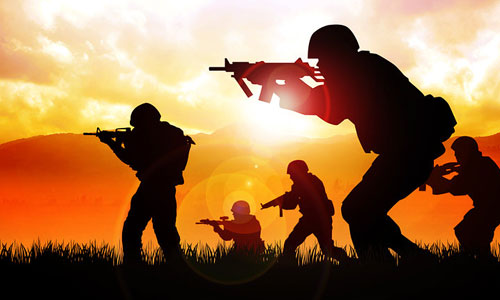6 Ways War Affects a Soldiers Mind

The horrors of war can never be put down in written form by any individual because the ones who write them have not experienced it fully and those who experience it fully do not retain the condition to be able to articulate it properly. And those who recuperate from the effects of war choose not to discuss anything to do with it in the future. Therefore, it is undeniably true that war affects the minds of everyone involved in it. But it is most certainly the soldiers who are most deeply affected. This is because they are right at the center of it all – everything happens in front of their eyes. They are constantly under inhuman pressure to perform their best and put their best feet forward while thinking straight, formulating strategies and following orders all at the same time. Needless to say, their lives are always hanging by a string. They witness the cruelest of human nature, they see brutality at its worst and they lose their friends and colleagues suddenly and unexpectedly, while at the same time being worried about their own safety and what would become of their families back home should anything happen to them. With all the uncertainties and perils that they have to face comes the long lasting psychological effects which become a lifelong companion if they manage to survive the war. Listed below are the 6 ways war affects a soldiers mind.
1. Post Traumatic Stress Disorder
Post Traumatic Stress Disorder or PTSD is diagnosed in most soldiers of war. It is the condition where a particular traumatic event or accident leaves a lasting impression on the victim’s mind. If a soldier sees a friend dying in front of their eyes or witnesses brutal deaths in close quarters, the scenes remain engraved in their psyche and they relive the same moments over and over again which thereby interfere with their normal everyday activities. PTSD patients find it hard to sleep and often have nightmares relating to the particular traumas. They also tend to react strongly to any event that reminds them of the trauma or is in any way related to it.
2. Hallucinations
Hallucinations are a common problem among soldiers. Often their brain tricks them to believe that they are at the war scene while they are asleep or are high on drugs or alcohol. Such hallucinations may also occur during wakefulness.
3. Shell Shock
Shell shock is the reaction to bombings experienced in close quarters. This is caused mainly by high intensity bombings which have a lasting impression on the soldiers. They experience moments of extreme helplessness which later manifest in panic attacks, fear, irrational thought and non-judgment. Shell shock is basically the loss of self control and giving up under insurmountable distress.





